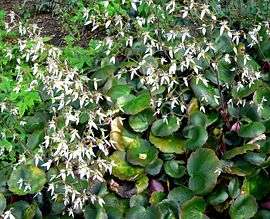Saxifraga stolonifera
| Saxifraga stolonifera | |
|---|---|
 | |
| Scientific classification | |
| Kingdom: | Plantae |
| (unranked): | Angiosperms |
| (unranked): | Eudicots |
| (unranked): | Core eudicots |
| Order: | Saxifragales |
| Family: | Saxifragaceae |
| Genus: | Saxifraga |
| Species: | S. stolonifera |
| Binomial name | |
| Saxifraga stolonifera Curtis | |
| Synonyms[1] | |
| |
Saxifraga stolonifera is a perennial flowering plant known by several common names, including creeping saxifrage, strawberry saxifrage, creeping rockfoil, as well as the quite ambiguous "Aaron's beard", mother of thousands,[2] roving sailor, wandering Jew,[2] and strawberry begonia or strawberry geranium[2] (it is neither a begonia nor a geranium). It is native to Asia but has been introduced to other continents, mainly for use as an ornamental. A popular garden flower, it has attractive white blossoms with distinctive pointed petals and bright yellow ovary. S. stolonifera also sees use as a houseplant. Its creeping green foliage makes a good groundcover. The plant spreads via threadlike stolon (runners), with plantlets taking root in the vicinity of the mother plant. It is hardy to USDA zone 5.
The foliage is occasionally used fresh or cooked in Japanese cuisine. It was also used as an herbal remedy in Classical Japan. It contains Quercetin which has been shown to have anti-cancer activity in vitro.[3]

References
- ↑ "The Plant List: A Working List of All Plant Species". Retrieved 10 February 2015.
- 1 2 3 Umberto Quattrocchi. CRC World Dictionary of Plant Names: Common Names, Scientific Names, Eponyms. Synonyms, and Etymology. CRC Press, 1999. p.2395-2396. ISBN 9780849326738
- ↑ Meeb Chen Z., Liu Y.-M., Yang S., Song B.-A., Xu G.-F., Bhadury P.S., Jin L.-H., Hu D.-Y., Liu F., Xue W., Zhou X. "Studies on the chemical constituents and anticancer activity of Saxifraga stolonifera (L)" Bioorganic and Medicinal Chemistry 2008 16:3 (1337-1344)
External links
| Wikimedia Commons has media related to Saxifraga stolonifera. |